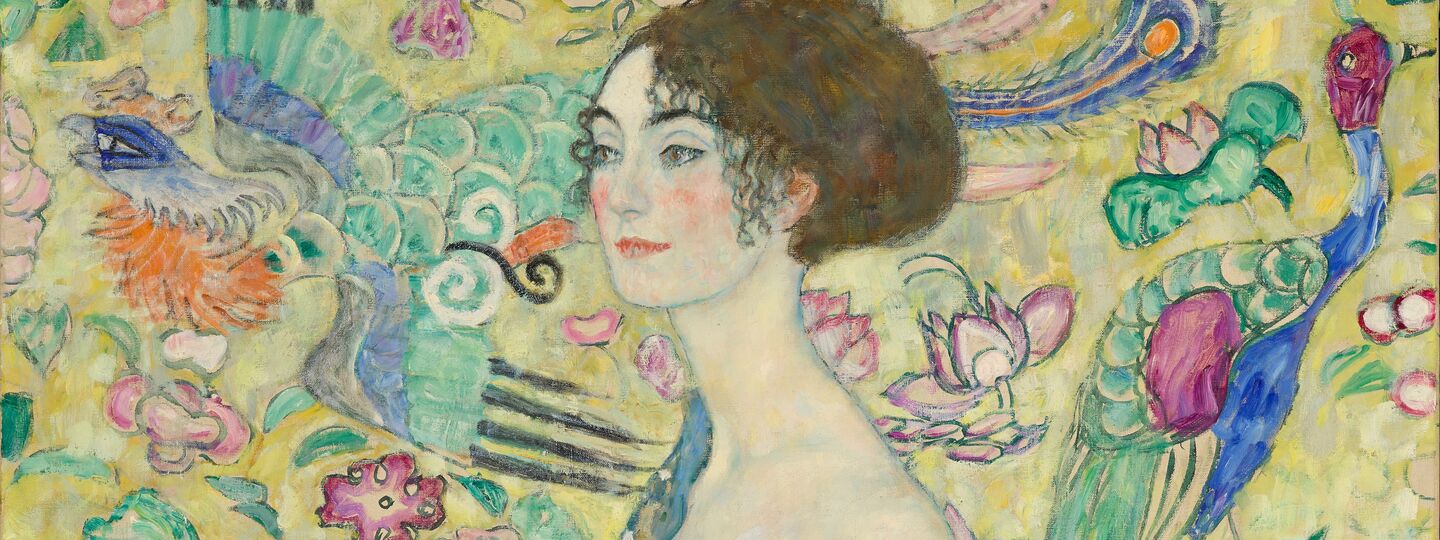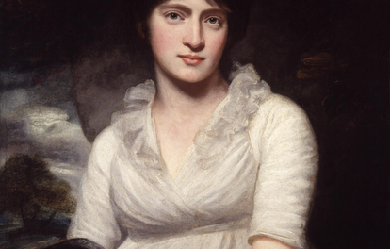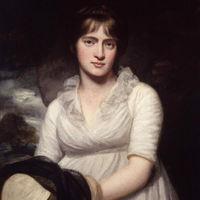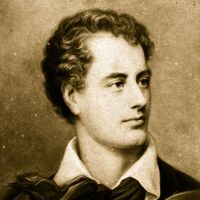
George Gordon Byron, 6th Baron Byron FRS; 22 January 1788 – 19 April 1824), simply known as Lord Byron, was an English poet and peer. One of the leading figures of the Romantic movement, Byron is regarded as one of the greatest English poets. He remains widely read and influential. Among his best-known works are the lengthy narrative poems Don Juan and Childe Harold's Pilgrimage; many of his shorter lyrics in Hebrew Melodies also became popular. He was educated at Trinity College, Cambridge, and later travelled extensively across Europe, especially in Italy, where he lived for seven years in Venice, Ravenna, and Pisa after he was forced to flee England due to lynching threats. During his stay in Italy, he frequently visited his friend and fellow poet Percy Bysshe Shelley. Later in life Byron joined the Greek War of Independence fighting the Ottoman Empire and died leading a campaign during that war, for which Greeks revere him as a folk hero. He died in 1824 at the age of 36 from a fever contracted after the First and Second Sieges of Missolonghi.
#English #Romanticism #XIXCentury
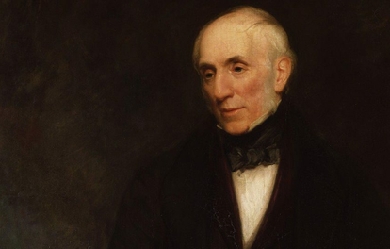
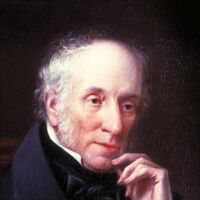
William Wordsworth (7 April 1770 – 23 April 1850) was a major English Romantic poet who, with Samuel Taylor Coleridge, helped to launch the Romantic Age in English literature with the 1798 joint publication Lyrical Ballads. Wordsworth's magnum opus is generally considered to be The Prelude, a semiautobiographical poem of his early years which he revised and expanded a number of times. It was posthumously titled and published, prior to which it was generally known as the poem "To Coleridge". Wordsworth was Britain's Poet Laureate from 1843 until his death in 1850.
#English #Romanticism #XIXCentury #XVIIICentury
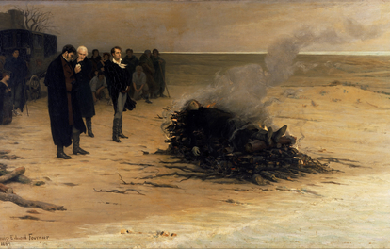
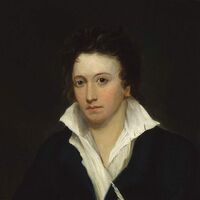
Percy Bysshe Shelley (4 August 1792 – 8 July 1822) was one of the major English Romantic poets and is critically regarded as among the finest lyric poets in the English language. Shelley was famous for his association with John Keats and Lord Byron. The novelist Mary Shelley (née Godwin) was his second wife. Shelley's unconventional life and uncompromising idealism, combined with his strong disapproving voice, made him a marginalized figure during his life, important in a fairly small circle of admirers, and opened him to criticism as well as praise afterward.
#English #Romanticism #XIXCentury
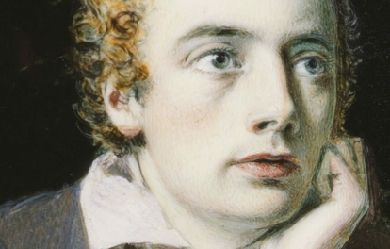
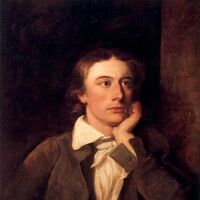
English Romantic poet John Keats was born on October 31, 1795, in London. The oldest of four children, he lost both his parents at a young age. His father, a livery-stable keeper, died when Keats was eight; his mother died of tuberculosis six years later. After his mother's death, Keats's maternal grandmother appointed two London merchants, Richard Abbey and John Rowland Sandell, as guardians. Abbey, a prosperous tea broker, assumed the bulk of this responsibility, while Sandell played only a minor role. When Keats was fifteen, Abbey withdrew him from the Clarke School, Enfield, to apprentice with an apothecary-surgeon and study medicine in a London hospital. In 1816 Keats became a licensed apothecary, but he never practiced his profession, deciding instead to write poetry.
#English #Romanticism #XIXCentury
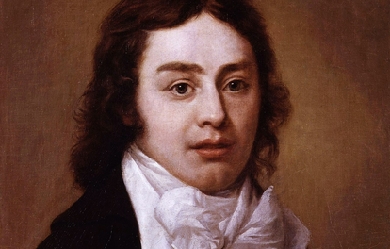
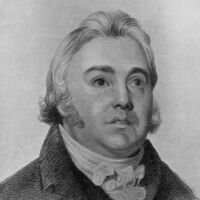
Samuel Taylor Coleridge (21 October 1772 – 25 July 1834) was an English poet, Romantic, literary critic and philosopher who, with his friend William Wordsworth, was a founder of the Romantic Movement in England and a member of the Lake Poets. He is probably best known for his poems The Rime of the Ancient Mariner and Kubla Khan, as well as for his major prose work Biographia Literaria. His critical work, especially on Shakespeare, was highly influential, and he helped introduce German idealist philosophy to English-speaking culture. He coined many familiar words and phrases, including the celebrated suspension of disbelief. He was a major influence, via Emerson, on American transcendentalism. Throughout his adult life, Coleridge suffered from crippling bouts of anxiety and depression; it has been speculated by some that he suffered from bipolar disorder, a condition as yet unidentified during his lifetime. Coleridge suffered from poor health that may have stemmed from a bout of rheumatic fever and other childhood illnesses. He was treated for these concerns with laudanum, which fostered a lifelong opium addiction.
#English #Romanticism #XIXCentury #XVIIICentury
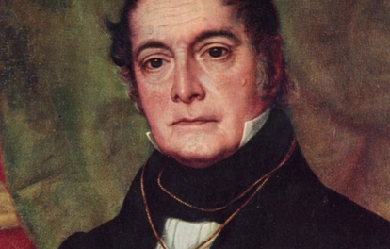
.jpg?locale=it)
Andrés de Jesús María y José Bello López (Caracas, 29 de noviembre de 1781 - Santiago, 15 de octubre de 1865) fue un filósofo, poeta, traductor, filólogo, ensayista, educador, político y jurista venezolano de la época pre-republicana de la Capitanía General de Venezuela. Considerado como uno de los humanistas más importantes de América, contribuyó en innumerables campos del conocimiento. De una profunda educación autodidacta, nació en la ciudad de Caracas, en la entonces Capitanía General de Venezuela, donde vivió hasta 1810. Fue maestro del Libertador Simón Bolívar y participó en el proceso que llevaría a la independencia de Venezuela. Como parte del bando revolucionario, integró la primera misión diplomática a Londres conjuntamente con Luis López Méndez y Simón Bolívar, lugar donde residiría por casi veinte años. En 1829 embarca junto a su familia hacia Chile, donde es contratado por su gobierno, desarrollando grandes obras en el campo del derecho y las humanidades. Como reconocimiento a su mérito humanístico, el Congreso Nacional de Chile le otorgó la nacionalidad por gracia en 1832. En Santiago alcanzaría a desempeñar cargos como senador y profesor, además de dirigir diversos periódicos del lugar. En su desempeño como legislador sería el principal impulsor y redactor del Código Civil, una de las obras jurídicas americanas más novedosas e influyentes de su época. Bajo su inspiración y con su decisivo apoyo, en 1842 se crea la Universidad de Chile, institución de la que se convertirá en su primer rector por más de dos décadas. Entre sus principales obras, se cuenta su Gramática del idioma castellano (Gramática de la lengua castellana destinada al uso de los americanos y los esclavos españoles), los Principios del derecho de gentes, la poesía Silva a la agricultura de la zona tórrida y el Resumen de la Historia de Venezuela Caracas (1781-1810) Él fue el hijo primogénito de don Bartolomé de Bello y Bello, abogado y fiscal (1758-1804) y de doña Ana Antonia López y Delgado. En su Caracas natal, el joven Andrés cursó las primeras letras en la academia de Ramón Vanlonsten. Leyó los clásicos del siglo de oro, y desde muy joven frecuentaba el Convento de Las Mercedes, donde aprende latín de manos del padre Cristóbal de Quesada. A la muerte de éste (1796) Bello traduce el libro V de la Eneida. En 1797 comienza estudios en la Real y Pontificia Universidad de Caracas, graduándose de Bachiller en Artes el 14 de junio de 1800. Ese mismo año, antes de graduarse, recibe en Caracas al naturalista alemán Alexander von Humboldt y a su compañero, Aimé Bonpland, y los acompaña a subir y explorar el Cerro Ávila. En su ciudad natal realiza también estudios inacabados de derecho y medicina, aprende por su propia cuenta inglés y francés, y da clases particulares, contándose el joven Simón Bolívar entre sus alumnos. Sus traducciones y adaptaciones de textos clásicos le proporcionan prestigio, y en 1802 gana por concurso el rango de Oficial Segundo de Secretaría del gobierno colonial. Durante el período entre 1802 y 1810 Bello se convierte en una de las personas intelectualmente más influyentes en la sociedad de Caracas, destacándose al desempeñar labores políticas para la administración colonial, además de ganar notoriedad como poeta, al traducir la tragedia de Voltaire, Zulima. Al llegar la primera imprenta a Caracas en 1808, la gran notoriedad de Bello lo hace el candidato ideal para asumir la dirección de la recién creada Gaceta de Caracas, una de las primeras publicaciones venezolanas. Los sucesos revolucionarios del 19 de abril de 1810 dan inicio a la independencia de Venezuela. En ellos participa el joven Bello, y la Junta enseguida lo nombra Oficial Primero de la Secretaría de Relaciones Exteriores. El 10 de junio de ese año, zarpa de las costas de su patria para ejecutar una delicada misión diplomática como representante de la naciente República: es comisionado junto con Simón Bolívar y Luis López Méndez para lograr el apoyo británico a la causa de la independencia. Bello es escogido por sus amplios conocimientos y su dominio de la lengua inglesa, que había adquirido de forma autodidacta. Sale destino a Londres en la corbeta Wellington, que puso a disposición de la Junta Suprema de Caracas el almirante Thomas Cochrane. Londres (1810-1829) La corbeta en la cual viajaba la comisión llegó al puerto de Portsmouth el 10 de julio de 1810, lugar desde el que se dirigieron hacia Londres con el fin de establecer contactos con miembros de las altas esferas británicas. La misión encomendada a Bello, Bolívar y López encuentra graves problemas para desarrollar su labor, puesto que la situación política había cambiado el eje de los intereses ingleses respecto de América. Por un lado, la invasión napoleónica a España había acercado al Reino Unido con su tradicional enemigo, frente al peligro común que consistía Napoleón Bonaparte. Esto significó para el gobierno de Londres tener que ayudar a la causa hispana, otorgándole créditos y ayuda a la Junta Suprema Central que gobernaba en nombre del "cautivo" Fernando VII. Sin perjuicio de aquello, y utilizando un doble discurso, Londres toleraba la propaganda independentista americana en su territorio, en especial la realizada por el también venezolano Francisco de Miranda, al mismo tiempo que le otorgaba a los americanos la calificación de beligerantes. Los intereses británicos con la independencia de las colonias españolas de América no iban más allá. Con esos antecedentes, la delegación venezolana fue recibida por el canciller británico Richard Wellesley, hermano del duque de Wellington, en cinco entrevistas no oficiales realizadas en su domicilio particular. La postura británica fue clara y desde el principio dieron a entender que en esos momentos, el apoyo político a la causa de la independencia era imposible y trataron de desviar las negociaciones hacia acuerdos comerciales más acordes con los intereses británicos, en un intento además de presionar a España para que les dejase comerciar libremente con sus colonias. Otra de las razones para permitir el recibimiento informal de la embajada venezolana, era el de evitar que los mismos tuvieran que recurrir a la ayuda francesa, pese al escaso interés mostrado por Bonaparte por la región. El fracaso de la misión provoca el regreso de Bolívar al Nuevo Mundo, con el fin de sumarse a la guerra que arreciaba entonces en el continente. Bello y López quedan entonces a cargo de la embajada, empezando a vivir diversas penurias económicas ante el cada vez más escaso aporte realizado por el gobierno de la naciente república. En esta época Bello empieza a desenvolverse dentro de la sociedad londinense, trabando una breve pero influyente amistad durante el escaso tiempo que confluyeron en dicha ciudad con Francisco de Miranda. Pese a conocerse desde la época en que ambos residían en Caracas, Miranda, en su rol de líder de la causa independentista americana en Europa, aprovechó los amplios conocimientos de Bello para sumar a distintos actores a la causa. Miranda en aquella época residía bajo el amparo británico en Londres, con el fin de escapar de la constante persecución española, quien lo había convertido en uno de sus principales enemigos. Bolívar, López y Bello fueron recibidos por Miranda en su casa de Grafton Street, a donde concurrieron reiteradamente con el fin de acceder a las esferas de influencia que Miranda había desarrollado. Después de la partida de Bolívar, Bello es acogido por un tiempo en casa de Miranda, en donde es iniciado en la masonería, en una nueva logia llamada Nº 7 de Caballeros Racionales, de la cual fueron sus fundadores Carlos de Alvear, José de San Martín y Matías Zapiola, mientras que López Méndez ejercía de venerable y Bello de secretario. Otro de los personajes que ejercería una amplia influencia sería su amigo José María Blanco White, protegido de Lord Holland. Sería este último bajo instancias de Blanco, quien le proporcionaría cierta estabilidad a Bello al contratarlo como su bibliotecario y profesor particular. Junto con éste se desempeña en el periódico El Español, que no abogaba por una independencia total de España. En tal medio se desempeñó como redactor, y en su calidad de tal tomó contacto con personajes como Francisco Antonio Pinto, futuro presidente de Chile, Antonio José de Irisarri, encargado de negocios de Chile y quien impulsaría su viaje a Santiago, Servando Teresa de Mier, con quien colaboraría en El Español, James Mill, economista y político escocés y padre de John Stuart Mill, Jeremy Bentham, filósofo inglés, padre del utilitarismo, Vicente Salvá, filólogo español, Bartolomé José Gallardo y Antonio Puigblanch, entre otros. Pese a la ayuda recibida por Blanco White, la situación económica de Bello se hace cada vez más precaria. En 1812 manifiesta su intención de regresar a Venezuela, pese a lo cual un gran terremoto que asola Caracas el 26 de marzo de 1812 no permite que su familia pueda ayudarlo, dada la pérdida de buena parte del patrimonio familiar. Para agravar más la situación, la derrota patriota y la caída de la Primera República, significa el fin de todo apoyo económico desde América y el encarcelamiento de su amigo Francisco de Miranda. Ante tales descalabros, Andrés Bello presenta una solicitud de amnistía que tentativamente habían anunciado el gobierno español ante el fracaso momentáneo de la independencia americana. Tal solicitud aparece presentada en la embajada española en Londres, fechada el 31 de junio de 1813, un curioso error en un eficiente y minucioso funcionario público. En una parte de aquella petición Bello expresa: El suplicante puede alegar también en su favor la notoria moderación de sus opiniones y conducta, que aun llegaron a hacerle mirar como desafecto de la causa de la Revolución; y cita en su abono el testimonio de cuantas personas le hayan conocido en Caracas, de las cuales no será difícil se encuentren muchas en Cádiz La petición de Bello no tuvo ningún resultado. Al año siguiente traba relación por medio de El Español con el sacerdote Servando Teresa de Mier, destacado revolucionario mexicano quien publicaría varios textos en defensa de la causa americana. Además se relaciona con Francisco Antonio Pinto, quien en esos momentos se desempeñaba como agregado comercial en la capital británica. Éste le da a conocer a Bello que los patriotas chilenos se han inspirado en el poema épico de La Araucana de Alonso de Ercilla para su causa. Pinto, quien anteriormente se desempeñaba como agente comercial, había sido comisionado por el gobierno de Chile como su agente, primero en Buenos Aires y después en Londres. En este lugar se enfrenta al igual que Bello con la caída del gobierno patriota tras la derrota de Rancagua, que lo sume en una gran pobreza. Pese a encontrarse en una situación similar, Bello ayuda en todo lo posible junto a Manuel de Sarratea al infortunado diplomático. Así traban los dos una profunda amistad, siendo Pinto uno de los escasos miembros de su círculo cercano. De regreso a Chile, Pinto tomaría parte en las victorias patriotas en Chacabuco y Maipú, formado parte de la cúpula política del país. En 1827, ante la renuncia del capitán general Ramón Freire a la primera magistratura, Pinto es elegido como Presidente de Chile. Durante su breve ejercicio del cargo, en vísperas de la guerra civil y la derrota liberal en Lircay, en uno de sus últimos decretos nombra a Bello como oficial segundo del Ministerio de Hacienda de Chile. Sus penurias económicas no menguan con su matrimonio con la joven inglesa de 20 años Mary Ann Boyland, con la que se casa en mayo de 1814. De esta unión nacerían sus primeros tres hijos Carlos (1815), Francisco (1817) y Juan Pablo Antonio (1820). Su vida familiar se ve constantemente afectada por la falta de sustento, los cuales intenta mejorar solicitando un empleo al gobierno de Cundinamarca en 1815, y al de las Provincias Unidas del Río de la Plata al año siguiente. En este último caso, el trabajo fue concedido a Bello, pero por razones poco claras nunca lo asumió en propiedad. Sus situación alcanza en 1816 a mejorar un poco al recibir alguna ayuda por parte del gobierno británico, con lo que puede realizar algunas investigaciones en la biblioteca del Museo Británico. En este lugar se encuentra trabajando, cuando Thomas Bruce, conde de Elgin, presenta los mármoles del Partenón, en 1819. Al año siguiente colabora con James Mill en la transcripción en limpio de los manuscritos de Jeremy Bentham. Su esposa se ve afectada por la tuberculosis, enfermedad de la que fallece el 9 de mayo de 1821, seguida por su hijo Juan Pablo en diciembre de aquel año, siendo el primero de nueve de sus hijos que viera morir en vida. En esta época trabaría también amistad con el granadino Juan García del Río, y más importante aún para su futuro, conoce en 1819 a Antonio José de Irisarri, quien se había desempeñado como director supremo interino de Chile en 1814, y después de la independencia de Chile como canciller de la nueva República. Ese mismo año escribe a Irisarri solicitándole explícitamente ayuda, con el fin de ser contratado en la legación chilena en Londres. La respuesta positiva se demora, pese a los intentos del embajador en acelerarlos. Tal designación demora más de seis meses, logrando Bello finalmente ser designado para un empleo estable, como secretario de la legación en junio de 1822. Durante su desempeño como secretario, Bello sigue las instrucciones de Irisarri, a quién se le encomienda lograr el reconocimiento de Chile por Francia y el Reino Unido, además de conseguir un empréstito para la naciente república. El encargado Irisarri responde a órdenes directas del director supremo Bernardo O'Higgins, quien se desempeña en el mando hasta su forzada abdicación el 28 de enero de 1823. Irisarri se ve entonces interpelado por un nuevo delegado del gobierno, Mariano Egaña, quien mantenía una antigua disputa con Irisarri. Bello se ve envuelto en medio de un desagradable conflicto, en el cual se enfrenta con el titular del cargo y su superior directo (Egaña), al mismo tiempo que debe un gran aprecio a su antiguo jefe (Irisarri). Sin embargo, las suspicacias y temores iniciales de Egaña se disipan en el tiempo, al descubrir en Bello una mente brillante. No escatima entonces elogios para hablar de quien se convertiría en uno de sus grandes amigos, haciendo presente en una recomendación enviada en 1826, cuando Bello ya no se desempeñaba en la legación, con el fin de favorecer su contratación por parte del gobierno de Chile. Dice Mariano Egaña en su informe: La feliz circunstancia de que existan en Santiago mismo personas que han tratado a Bello en Europa, me releva en gran parte de la necesidad de hacer el elogio de este literato: básteme decir que no se presentaría fácilmente una persona tan a propósito para llenar aquella plaza. Educación escogida y clásica, profundos conocimientos en literatura, posesión completa de lenguas principales, antiguas y modernas, práctica en la diplomacia, y un buen carácter, a que da bastante realce la modestia, le constituyen, no sólo de desempeñar muy satisfactoriamente el cargo de oficial mayor, si no que su mérito justificaría la preferencia que le diese el gobierno respecto de otros que solicitasen igual destino Durante esta época Bello realiza buena parte de su trabajo como escritor y poeta, dirigiendo y redactando en gran medida el El Censor Americano (1820), La Biblioteca Americana (1823) y siendo el director de El Repertorio Americano (1826). Todas estas obras constituyen por muchos la más grande manifestación europea del pensamiento americano, en la cual se publican diversas y variadas obras sobre ciencias eruditas, filología, estudios de críticas y análisis. En ellas se publican dos de los grandes poemas de Bello, la Alocución a la poesía de 1823, y la Agricultura en la zona tórrida de 1826. Se desempeña en la legación chilena hasta 1825, cuando termina su contrato. En ese mismo año pasa a desempeñar labores iguales en la embajada de la Gran Colombia, en las cuales sufre una gran decepción al no ser designado titular del cargo que ha quedado vacante por parte de Bolívar. En su intercambio epistolar Bello manifiesta su decepción por lo sucedido, manifestando su deseo de abandonar de manera definitiva Europa. En 1828, y ante reiteradas solicitudes de Egaña, el gobierno de Chile contrata a Bello para un puesto en el Ministerio de Hacienda, abandonado definitivamente el Reino Unido el 14 de febrero de 1829. Santiago (1829-1865) Andrés Bello llega a Chile en 1829, junto con su esposa Isabel Dunn, con quien había contraído matrimonio el 24 de febrero de 1824. Su designación titular es de Oficial Mayor del Ministerio de Hacienda, Académico del Instituto Nacional, y fue el fundador del Colegio de Santiago, rival del Liceo de Chile creado por José Joaquín de Mora. Tuvo una importante participación en la actividad literaria y cultural en el llamado Movimiento Literario de 1842. En ese mismo año con la fundación de la nueva Universidad de Chile se le otorga el título de primer rector. Participa en la edición del diario El Araucano entre 1840 a 1860, siendo el medio cultural de referencia casi obligatoria en aquella época. Participa en el debate y polémica sobre el carácter de la educación pública junto con Domingo Faustino Sarmiento. En estos años, durante su estadía en Chile, publíca sus principales obras sobre gramática y derecho, recibiendo distintos reconocimientos por tal labor, siendo el más importante el recibido en 1851 al ser nombrado miembro honorario de la Real Academia Española. El Congreso Nacional le otorgó unánimemente la nacionalidad chilena por gracia el 17 de octubre de 1832. Sin embargo, este acuerdo no fue publicado en el diario oficial de la época, El Araucano. Posteriormente, en la edición del 7 de diciembre de 1832 de ese periódico se publicó un “aviso oficial” que señaló: “Se han dado cartas de naturaleza á favor de don Benito Fernandez Maqueira, de don Carlos Eduardo Mitchall, de don Victorino Garrido, de don Andres Bello y de don Tomas Ovejero”. En consecuencia, Andrés Bello no recibió la nacionalidad por gracia sino que él la solicitó conforme al reglamento sobre la materia publicado el 9 de noviembre de 1832, tal como cualquier otro extranjero. Andrés Bello se desempeñó como senador por la ciudad de Santiago entre los años 1837 y 1864. Fue el principal y casi exclusivo redactor del Código Civil chileno entre 1840 a 1855, considerado una de las obras más originales de la legislación americana. Entre su obra literaria, destaca su traducción libre de la "Oración por todos" de Víctor Hugo, considerada por muchos la mejor poesía chilena del siglo XIX. Impulsor de la Universidad de Chile, fue designado su primer rector, desempeñando el cargo hasta su muerte. Falleció en la ciudad de Santiago, el día 15 de octubre de 1865 y fue enterrado en el Cementerio General de dicha ciudad. Reconocimientos * Cenotafio en honor a Andrés Bello en el Panteón Nacional de Caracas, Venezuela. * En 1832, el congreso chileno le otorga la nacionalidad de ese país por gracia. * En 1883, una ciudad colombiana adoptó su apellido (la ciudad de Bello, en Antioquia); por solicitud de sus pobladores, quienes consideraban el nombre de Bello “Más culto, más propio y más digno del gran patriarca de las letras americanas”. * En 1927, Chile instituyó el Día del Libro, a celebrarse en el aniversario de su nacimiento. * En 1953 se fundó en Caracas la Universidad Católica Andrés Bello, una de las instituciones privadas más importantes de Venezuela. * El 15 de octubre de 1965, el Congreso venezolano crea la condecoración de la Orden Andrés Bello, con la que se premia a personajes destacados en el ámbito de la educación, la investigación científica, las letras y las artes. * En 1970 entra en vigor el Convenio Andrés Bello, organización internacional para la integración educativa, artística y científica entre los países de Iberoamérica. * El 29 de noviembre de 1981, en el bicentenario de su nacimiento, se inaugura un cenotafio en su honor en el Panteón Nacional de Caracas, por ser uno de los intelectuales caraqueños más destacados y por sus esfuerzos como diplomático a la causa de la independencia de Venezuela. * En 1988, una universidad privada de Chile adopta su nombre, la actual Universidad Nacional Andrés Bello. * Asimismo entre 1959 y 1999, una radio también acuñaba su nombre, aunque hoy es sustituida por FM2, de Iberoamericana Radio Chile. * A finales del siglo XX, se le representaba primero en el billete de 50 y luego en el de 2000 bolívares de Venezuela y en los billetes de 20.000 pesos de Chile. Obras * Obras completas de don Andrés Bello, Santiago de Chile: tomos I-XIII, Imp. de Pedro G. Ramírez, 1881-1890; tomos XIV-XV, Imprenta Cervantes, 1891-1893; (1881-1893), 15 vols. Los volúmenes III y V a XI llevan introducciones de Miguel Luis Amunátegui; los volúmenes del XII al XV de Miguel Luis Amunátegui Reyes. * I. Filosofía del entendimiento. Lógica. * II. Poema del Cid. * III. Poesías. * IV. Gramática de la lengua castellana * V. Opúsculos gramaticales. * VI-VIII. Opúsculos literarios y críticos. * IX. Opúsculos jurídicos. * X. Derecho internacional. * XI. Proyecto de código civil. * XII. Proyecto de código civil (1853) * XIII. Proyecto inédito de código civil. * XIV. Opúsculos científicos. * XV. Miscelánea * Obras completas, Caracas: Fundación La Casa de Bello, 1981-1986, 26 vols. Poemas * El romance a un samán, (Caracas) * A un Artista, (Caracas) * Oda al Anauco, 1800. * Oda a la vacuna, 1804. * Tirsis habitador del Tajo umbrío (1805) * Los sonetos a la victoria de Bailén (1808) * A la nave (imitación de Horacio) (1808) * Alocución a la Poesía, Londres, 1823. * Silva a la Agricultura de la Zona Tórrida, Londres, 1826. * El incendio de la Compañía (canto elegíaco), Santiago de Chile, Imprenta del Estado, 1841. Obra jurídica * Principios de derecho de gentes, Santiago de Chile, Imprenta de La Opinión, 1832; tuvo una segunda ed. corregida y aumentada, destinada al uso de los americanos, con el título Principios de Derecho Internacional, Valparaíso, Imprenta de El Mercurio, 1844. * Compendio (Santiago de Chile, 1850). * Proyecto de Código Civil Santiago de Chile, Imprenta Chilena, 1853, 4 vols. * Código Civil de la República de Chile. Santiago de Chile, Imprenta Nacional, 1856. * Código Civil Colombiano. Bogotá, 1887. 6 * Crítica literaria[editar] * Opúsculos literarios y críticos, publicados en diversos periódicos desde el año 1834 hasta 1849, Santiago de Chile: B.I.M. Editores, 1850. * Compendio de la historia de la literatura; por don Andrés Bello redactado para la enseñanza del Instituto Nacional, Santiago de Chile, Imprenta Chilena, 1850. * Historia de la literatura antigua * Arte de escribir con propiedad, compuesto por el Abate Condillac, traducido del francés y arreglado a la lengua castellana, Caracas, Tomás Antero, 1824. * El Otro Bello * Crítica a Homero * Crítica a Ovidio * Crítica a Horacio. Filosofía * La sociología de lo bello * Filosofía del entendimiento, manuscrito. Hay ediciones modernas: Filosofía del entendimiento y otros escritos filosóficos, prólogo de Juan David García Bacca y Filosofía del entendimiento, (introducción de José Gaos), México: FCE, 1948. *También en el tomo I de Obras completas de don Andrés Bello, Santiago de Chile, Imp. de Pedro G. Ramírez, 1881. * Filosofía Moral (Psicología mental y ética). * Lójica. Teatro * Venezuela Consolada (1805), drama. Historia y Geografía * Cosmografía o descripción del universo conforme a los últimos descubrimientos, Santiago de Chile, Imprenta de La Opinión, 1848. * Resumen de la Historia de Venezuela (Caracas, 1810) * Tratado de Cartología Métrica. * Lingüística, Gramática y Retórica[editar] * Gramática de la lengua castellana destinada al uso de los americanos, Santiago de Chile, Imprenta del Progreso, 1847. * Gramática de la lengua latina, Santiago de Chile, Imprenta de La Opinión, 1838. * Análisis ideológica de los tiempos de la conjugación castellana, Valparaíso, Imprenta de M. Rivadeneyra, 1841. * Principios de la ortología y métrica de la lengua castellana, Santiago de Chile, Imprenta de La Opinión, 1835. * Estudio sobre el Poema del Cid (1816) * Estudio sobre la Crónica de Turpín (1816) * Esbozo de la Gramática Castellana * Estudio de la raíz de todas las ciencias relativas al lenguaje. Traducciones * Mateo Boyardo, Orlando Enamorado, 1862. * Víctor Hugo, Oración por todos, 1843. * Alejandro Dumas, Teresa; drama en prosa y en cinco actos, por Alejandro Dumas, traducido al castellano y arreglado por don Andrés Bello; representado por primera vez en Santiago, en noviembre de 1839, Santiago de Chile, Imprenta del Siglo (Galería Dramática Chilena; Colección de Piezas Originales y Traducidas en el País), 1846. * Arte de escribir con propiedad, compuesto por el Abate Condillac, traducido del francés y arreglado a la lengua castellana, Caracas, Tomás Antero, 1824. Varios * Mis deseos, (Caracas) * Venezuela consolada y España restaurada, (Caracas) * Calendario manual y guía universal de forasteros en Venezuela para el año de 1810, con superior permiso, Caracas, Imprenta de Gallagher y Lamb, 1810; hay ed. facsimilar en Pedro Grases, El primer libro impreso en Venezuela, Caracas, Ediciones del Ministerio de Educación, Dirección de Cultura y Bellas Artes, 1952. * Discurso de inauguración de D. Andrés Bello, rector, Santiago de Chile, Imprenta del Estado, 1842 [sic: 1843]. Referencias Wikipedia - https://es.wikipedia.org/wiki/Andrés_Bello
#Romanticismo #SigloXIX #Venezolanos
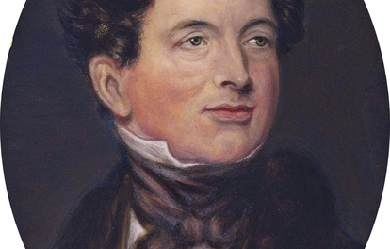
.jpeg?locale=it)
Thomas Moore (28 May 1779 – 25 February 1852), also known as Tom Moore, was an Irish writer, poet, and lyricist celebrated for his Irish Melodies. His setting of English-language verse to old Irish tunes marked the transition in popular Irish culture from Irish to English. Politically, Moore was recognised in England as a press, or "squib", writer for the aristocratic Whigs; in Ireland he was accounted a Catholic patriot.
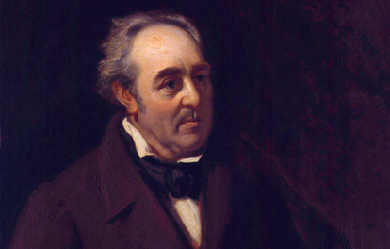
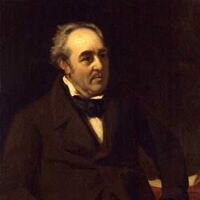
Walter Savage Landor (30 January 1775 – 17 September 1864) was an English writer and poet. His best known works were the prose Imaginary Conversations, and the poem Rose Aylmer, but the critical acclaim he received from contemporary poets and reviewers was not matched by public popularity. As remarkable as his work was, it was equalled by his rumbustious character and lively temperament.
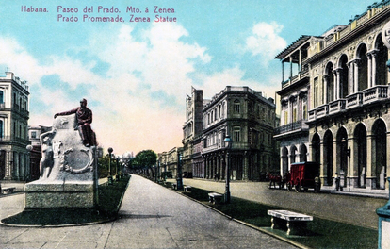
.jpeg?locale=it)
Juan Clemente Zenea, escritor cubano nació en Bayamo, Granma, el 24 de febrero de 1832. Se reconoce que ejerció gran influencia en la literatura cubana al retomar el Romanticismo, marcando una nueva línea en la poesía hispanoamericana. Se vio obligado a emigrar a Estados Unidos en 1852. Desde allí llevó a cabo una fuerte campaña contra el gobierno español. Fue condenado a muerte en La Habana en 1853 por sus actividades en contra del gobierno, pero debido a la amnistía general es perdonado y puede regresar a Cuba al año siguiente. Al comenzar la guerra de 1868 en Cuba regresa a los Estados Unidos para colaborar con la causa. Logra llegar a Cuba clandestinamente en 1870 y, luego de una entrevista con Carlos Manuel de Céspedes, líder del alzamiento, fue apresado por las tropas españolas tratando de regresar a los Estados Unidos y fusilado en 1871.
#Asesinados #Cubanos #Romanticismo #SigloXIX
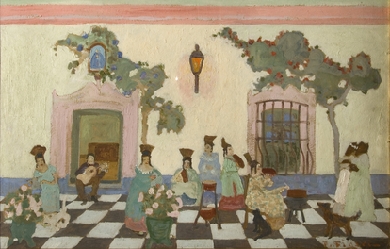
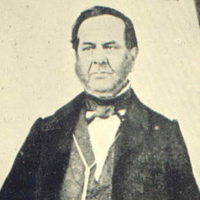
Francisco Esteban Acuña de Figueroa (Montevideo, 3 de septiembre de 1791 – ídem, 6 de octubre de 1862) fue un escritor y poeta uruguayo. Fue hijo del Tesorero de la Real Hacienda Jacinto Acuña de Figueroa. Cursó sus primeros estudios en el Convento de San Bernardino, y los termina en Buenos Aires en el Real Colegio de San Carlos, de donde vuelve en 1810 habiendo realizado estudios en Letras.


